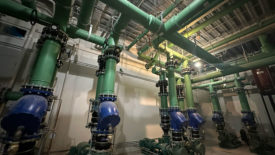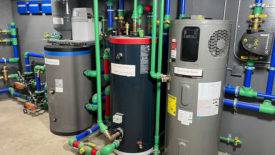Home » Keywords: » mechanical engineers
Items Tagged with 'mechanical engineers'
ARTICLES
Editor's Note | Nicole Krawcke
A standardized definition will help advance the industry.
Read More
Editor's Note | Nicole Krawcke
Nominations open for 2024 Class of Next Gen All Stars!
Submit your nomination for our annual Top 20 Under 40 Contest by June 28.
June 7, 2024
Plumbing Talking Points | David Dexter
Plumbing application and implementation varies around the world
Plumbing, what is it?
June 5, 2024
University’s new sports complex benefits from hydronic heating and cooling system
Uponor PP-RCT offers a lightweight solution, promoting faster installation and jobsite safety.
May 20, 2024
Editor's Note | Nicole Krawcke
MEP engineers are the Earth’s unsung heroes
Sustainable solutions significantly contribute to protecting the environment.
May 13, 2024
Heat pumps maximize efficiency, combining hot water and space heating
The road to electrification and decarbonization.
January 15, 2024
Editor's Note | Nicole Krawcke
2024 — a new year with a heightened focus on sustainability and efficiency
Regulations push the need for greener buildings.
January 10, 2024
Editor's Note | Nicole Krawcke
Engineers should explore advantages of AI
Artificial Intelligence is changing the game.
December 11, 2023
As electric boilers gain popularity, gas boilers still play vital role in reduced emission designs
Retrofitting buildings to electric heat can come with several challenges.
November 16, 2023
Editor's Note | Nicole Krawcke
Continuing education in a post-COVID world
How do you prefer to learn about new products and technologies?
November 13, 2023
Keep the info flowing with our eNewsletters!
Get the latest industry updates tailored your way.
JOIN TODAY!Copyright ©2024. All Rights Reserved BNP Media.
Design, CMS, Hosting & Web Development :: ePublishing












